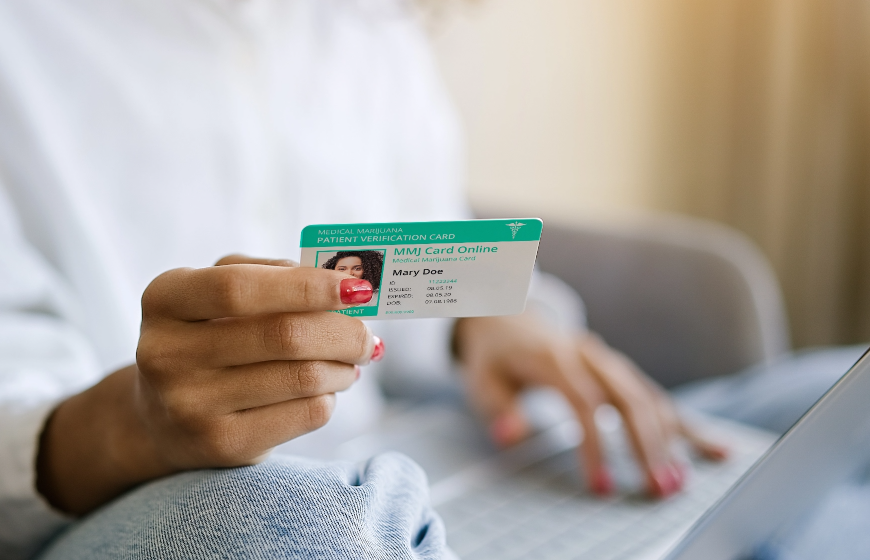How to Get an Illinois Medical Marijuana Card

Schedule an Online MMJ Consultation
The first step toward getting an MMJ card in Illinois is having a consulting with a qualified healthcare provider to see whether medical cannabis is a suitable treatment for your condition. In Illinois, a qualified healthcare practitioner includes:
- Physician (M.D. or D.O.)
- Physician assistant (PA)
- Advanced nurse practitioner (ARNP)
The practitioner must be licensed under the Medical Practice Act of 1987, have a controlled substance license under the Illinois Controlled Substance Act, and be in good standing with the state. They also must have a bonafide relationship with the patient.
When you register using our MMJ Card Online service, we will connect you directly to a qualified Illinois practitioner that will conduct your MMJ consultation online, and let you know in as little as 10 minutes whether or not you qualify for a medical marijuana card in Illinois. Many physicians charge $200-$300 for an in-person consultation, but online services are much cheaper.
It’s worth pointing out that military veterans do not require a written physician recommendation. They still however must provide records from their attending VA establishments for the previous 12 months.

Register with the Illinois Medical Marijuana Program
Once you have been approved for an MMJ card by a qualifying practitioner, you must register online with the Illinois medical cannabis program. This involves creating an online account with the Illinois Cannabis Tracking System (ICTS).
This part of the process can be tedious and confusing, and is really where an all-inclusive online service is helpful. Rather than having to navigate an array of confusing paperwork and applications, our professional team does everything for you when you sign up through the MMJ Card Online platform.

Visit a Licensed Illinois Dispensary
Once registration is complete, you can visit a dispensary and start purchasing your cannabis meds! The state no longer issues plastic MMJ cards, but as soon as you’re approved (often on the same day) you can print the downloadable version of your certificate and present this (along with your driver’s license or Illinois ID card) at an official state-licensed cannabis dispensary.
How to Apply for a Medical Marijuana Card in Illinois
: Step-by-Step Guide
- Consult a licensed healthcare professional to confirm the diagnosis of a qualifying condition and that MMJ is suitable for you.
- Minors require certification from two physicians, while veterans can use the medical records from their attending VA establishment.
- Register with the ICTS and follow the on-screen prompts to input your details.
- Pay the appropriate fees.
- If approved, you will receive a downloadable MMJ card that you must print.
- Bring your printed MMJ card and state-issued ID to a licensed dispensary and purchase your medicine.
Illinois Medical Marijuana Card Qualifying Conditions
To apply for a medical marijuana card in IL, you must:
- Be aged 18+
- Be diagnosed by one of the qualifying conditions outlined below
- Not hold a school bus driver permit or commercial driver’s license
- Not be an active-duty firefighter, law enforcement officer, probation officer, or correction officer
Before starting your application, you also need to prepare the following:
- A passport-size photo with a plain white background (in jpeg format)
- Two separate forms of proof of Illinois residency (a utility bill, State of Illinois-issued identification card or driver’s license, bank statements, or voter ID card)
- Proof of identity
- Veterans must provide medical records from their attending VA facility.
Patient Qualifying Conditions
To obtain MMJ in Illinois, you must have been diagnosed with a qualifying medical condition. Fortunately, the list is one of the longest in the country and includes a wide variety of ailments. The IL medical marijuana card qualifying conditions include the following:
- Post-concussion syndrome
- Dystonia
- Interstitial cystitis
- Hydrocephalus
- Severe fibromyalgia
- HIV/AIDS
- Hepatitis C
- Fibrous dysplasia
- Arnold-Chiari malformation and syringomyelia
- Amyotrophic lateral sclerosis (ALS)
- Agitation of Alzheimer’s disease
- Causalgia
- Complex regional pain syndromes type I
- Complex regional pain syndrome type II
- Crohn’s disease
- Chronic inflammatory demyelinating polyneuropathy
- Cancer
- Cachexia
- Multiple sclerosis
- Lupus
- Myoclonus
- Neurofibromatosis
- Nail-patella syndrome
- Muscular dystrophy
- Parkinson’s disease
- Myasthenia gravis
- Rheumatoid arthritis
- Sjogren’s syndrome
- Tourette’s syndrome
- Seizures, including those characteristic of epilepsy
- Spinal cord injury
- Traumatic brain injury
- Spinocerebellar ataxia
- Spinal cord disease, including those characteristic of Tarlov cysts, hydromyelia, arachnoiditis, syringomyelia
- Residual limb pain
- Terminal illness
Illinois residents can also petition the Department of Public Health to add other debilitating conditions. Petitions are accepted between December 1st and December 31st each year.
General Guidelines
Below, we will discuss more relevant details regarding applying for an MMJ card in Illinois and answer your most frequently asked questions.
Medical Marijuana Card Renewal in Illinois
When you are due to renew your card, you receive an email with a link to your ICTS account. Log in and follow the on-screen prompts to complete your application and pay your renewal fee. You can renew your card for either one or two years. You also have the option to add or remove a caregiver and update your personal details if necessary.
Caregiver Rules
Minors (those under 18) and adults who cannot care for themselves can designate a caregiver to help them purchase and use MMJ. Caregivers must enroll in the state program and meet specific criteria, including:
- Be aged 21 or older
- Be a resident of Illinois
- Have agreed to assist a patient with their medical cannabis use
- Not be convicted of a disqualifying offense
Caregivers can only assist one patient at a time. However, patients can assign as many as three primary caregivers. For minors, at least one of these caregivers must be a parent or legal guardian.
A Brief History of Cannabis in Illinois
Illinois banned cannabis in 1931, six years before the Marihuana Tax Act made it illegal throughout the United States. It remained unavailable to residents until 2012, when the Compassionate Use of Medical Cannabis Pilot Program Act passed.
In 2016, Illinois decriminalized the possession of up to 10 grams of cannabis. Then, in May 2019, recreational laws were passed, although residents had to wait until early 2020 to buy weed legally in Illinois.
Now, adults aged 21+ can legally buy and possess up to an ounce. However, medical marijuana patients have more generous purchasing limits, meaning that it is still worthwhile getting an MMJ card in Illinois if you are eligible.
Illinois Medical Marijuana Laws and Rules
Illinois residents can buy and possess up to 30 grams of cannabis without a medical marijuana card. Meanwhile, non-residents can buy a maximum of 15 grams.
Possession of more than these amounts but less than or equal to 100 grams is classed as a misdemeanor on the first offense. The possible penalty is a jail term of 12 months. A second offense is classed as a felony and could result in three years of incarceration and a $25,000 fine.
Selling 2.5 grams or less without a license is a classed as a misdemeanor, while selling 10+ grams is a felony.
Furthermore, recreational users cannot cultivate cannabis and will receive a $200 fine for cultivating five plants or less for personal use. MMJ patients can grow up to five plants, which must not exceed five inches in height. Growing six or more plants, even as an MMJ patient, is classed as a felony with a maximum prison sentence of three years.
What Types of Cannabis Products Can I Purchase in IL?
Illinois MMJ cardholders can purchase a wide variety of products, including:
- Dry herb
- Pre-rolls
- Tinctures
- Topicals
- Vape products
- Extracts
- Edibles
How Much Cannabis Can I Buy & Possess?
MMJ patients can buy and possess an “adequate” amount of cannabis, usually 2.5 ounces every 14 days. Your physician can sign a written statement allowing you to buy and possess more if necessary.
Registered MMJ patients and caregivers can cultivate up to five marijuana plants at home. Each cultivated plant must be no more than 5 inches tall, and the growing space must be locked, enclosed, and hidden from public view. Cultivation by MMJ patients or caregivers can only take place on residential properties owned by the cultivators or for which the owner’s consent to grow medical marijuana has been obtained.
Where Can I LEGALLY Purchase MMJ in IL?
Patients no longer have to nominate a dispensary and can visit any licensed establishment in the state. Plenty of options exist, and a complete list is available on the Illinois Department of Public Health website.
Can I Take My MMJ to a Different State?
Cannabis is still federally illegal and, therefore, cannot be transported across state lines. This is even the case when traveling from one legal state to another. Illinois does not accept out-of-state medical cards, although some states may accept MMJ cards issued in Illinois. We recommend checking whether Illinois medical cards are valid in the state you plan to visit before traveling.
FAQ: Applying for an Illinois MMJ Card
Since the ICTS has stopped issuing plastic cards, the process has become significantly quicker. You will now receive a printable card as soon as your application is approved. Using MMJ Card Online could make the process even quicker by connecting you with marijuana-friendly doctors in Illinois and offering fast online consultations.
Here at MMJ Card Online, our approval rate is exceptionally high. However, if for some reason you are not approved, we offer a money-back guarantee. In this case, adults over 21 can still access cannabis in Illinois via the recreational program, although the purchasing and possession limits are lower.
The medical marijuana card cost in IL depends on how long the card is valid and whether you wish to add caregivers. It can range between $25 and $300 for the card, and you must also pay your physician’s consultation fees.
Regular Patient Application Fee (including minors)
- 1 year -$50
- 2 years - $100
- 3 years - $125
Reduced Fee Application ( for those on SSI, SSDI, and veterans)
- 1 year -$25
- 2 years - $50
- 3 years - $75
Designated Caregiver Fee
- 1 year -$25
- 2 years - $50
- 3 years - $75
Regular Patient Application Fee with One Caregiver
- 1 year -$75
- 2 years - $150
- 3 years - $200
Regular Patient Application Fee with Two Caregivers
- 1 year -$100
- 2 years - $200
- 3 years - $275
Regular Patient Application Fee with Three Caregivers
- 1 year -$125
- 2 years - $250
- 3 years - $350
Reduced Fee Application with One Caregiver
- 1 year -$50
- 2 years - $100
- 3 years - $150
Reduced Fee Application with Two Caregivers
- 1 year -$75
- 2 years - $150
- 3 years - $225
Reduced Fee Application with Three Caregivers
- 1 year -$100
- 2 years - $200
- 3 years - $300
Physician’s fees vary but are often in the region of $200–300. Get in touch today to find out whether you could save money and time by using MMJ Card Online to apply for your medical card in Illinois.